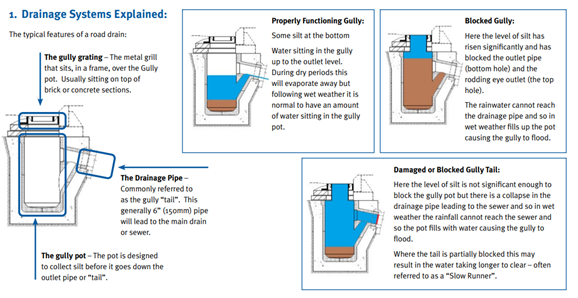Drainage and flooding
Overview
We maintain over 86,650 roadside drains, also known as gullies, on our roads.
We aim to clean all drains on the public highway at least once every two years although some drains will be cleaned annually or twice a year based on risk of flooding. We have limited resource to additionally clean any drains outside of this schedule.
Before reporting any drain or gully issues, please check when the gully is programmed to be cleansed first. If there is no risk to property flooding or major road flooding, the gully will be cleansed as per the scheduled programme.
How do grid/gullies work?
Every grid/gully has a ‘pot’ underneath. This is designed to collect as much silt and waste as possible to minimise the risk of a blockage. Our teams jet wash and cleanse all the grids/gullies on our road network to ensure that the collection of waste is removed so water can flow freely.

How you can help
As we have so many gullies, we can't service them all regularly. Very often when we respond to a call out for a blocked drain on the road, we find that the grate is just covered by wet leaves or grass. This acts like a plug and stops the water flowing down it freely.
If you notice that a gully on your street has become blocked by leaves which can be easily brushed away, without putting yourself or others at risk, please brush the blockage to one side. Clearing the leaves regularly makes sure the water can flow freely into the drain next time we get heavy rain.
If you can't clear the blockage yourself safely, please report it to us and we will clear it as soon as we are able to.

